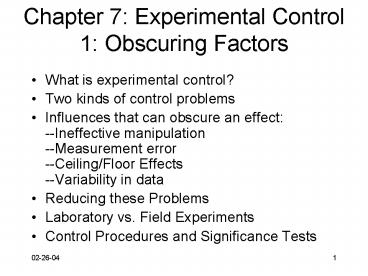Chapter 7: Experimental Control 1: Obscuring Factors - PowerPoint PPT Presentation
1 / 30
Title:
Chapter 7: Experimental Control 1: Obscuring Factors
Description:
Influences that can obscure an effect: --Ineffective manipulation ... No effect - Worry about ... A plover faking an injury. 19. Ristau's Experiment. 20 ... – PowerPoint PPT presentation
Number of Views:37
Avg rating:3.0/5.0
Title: Chapter 7: Experimental Control 1: Obscuring Factors
1
Chapter 7 Experimental Control 1 Obscuring
Factors
- What is experimental control?
- Two kinds of control problems
- Influences that can obscure an effect--Ineffecti
ve manipulation--Measurement error--Ceiling/Floo
r Effects--Variability in data - Reducing these Problems
- Laboratory vs. Field Experiments
- Control Procedures and Significance Tests
2
The Ideal
3
The Reality Many things can affect the DV
4
To see the effect of the IV on the DV we can
5
Two Kinds of Control Problems
- Obscuring Factors
- Confounding Factors or Confounded Variables
- No effect -gt Worry about obscuring factors
- Manipulation did have an effect -gt Worry about
confounding factors
6
Obscuring Factors
- Ineffective Manipulations
- Measurement Error
- Ceiling/Floor Effects
- Variability
7
Ineffective Manipulations
- Adolph, 1947
- Do rats eat for taste or calories?
- Importance of a manipulation check
- Mood and Memory
8
Measurement Error
- Administer a drug to reduce hunger
- Later ask each subject how hungry he/she is
- Suppose the observed data (subjects ratings of
hunger do not show expected effect) -- B of
Figure 7.2 - Possibility of measurement error
9
Measurement Errors
10
Ceiling Effects
11
Reducing Variability Finding an Appropriate
Design
12
Variability The Situation
- Variability in external situation can affect data
- Noise in external environment
- Internal Factors (e.g. tiredness, hunger, etc.)
- Meticulous control?
13
Pavlovs Lab Exterior
14
Pavlovs Lab Floor Plan
15
Pavlovs Lab Floor Plan
16
How Much Control?
- Varies
- Cant control everything
- Control those variables that have the greatest
effect on the DV - Randomize what you cant control
- Randomization is the single best method of control
17
Sacrificing Control The Field Experiment
- Lab Simplified Situation
- Field Experiment Experiment in a natural setting
- The Liquor Store Robbery Example
- An Injury-faking Bird
18
A plover faking an injury
19
Ristaus Experiment
20
Field or Laboratory?
- Field Study increases confidence in IVs effect
- A continuum
- Controlling for observer effects bias
- What is a natural setting
21
Degree of Control
22
How Do We Choose?
- Field Experiments Pick up Powerful Effects
- Field Data May be More Generalizable
- The Question of Real Life
- How much to control?
23
Field Experiments
- Large Effects
- Subtle Influences
- If we get an effect in a Field Experiment
- Some effects cant be obtained in the laboratory
OR vice versa
24
Field Data May be More Generalizable
- External Validity Issue
- Greater variability in conditions under which an
effect may be obtained
25
Question of Real Life
- Laboratory is an unnatural environment
- Separation of confounded variables
- Does this apply in the natural situation?
- Field Experiment--automatically know whether it
applies to a natural situation - Another view Predicting a specific laboratory
result from a theory
26
How Much to Control?
- Select IV and DV
- Decide what to control and what not
- Literature and other researchers as guide
- Importance of pilot studies
27
Field or Laboratory Experiment?
- Importance of the Power of an Effect
- Power of the Manipulation versus the Power (or
sensitivity) of the Design - Field Experiments only Pick up Powerful Effects
- Generalizability
- The Real Life Question
28
Significance Tests Experimental Control
- The importance of proper design
- Significance depends on--The effect of the
manipulation (treatment)--Our control over
non-systematic variability (error)--Sample Size - Trade-offs
29
?
30
Summary
- An experiment looks at effect of one or more
variables on a Dependent Variable - Control other (extraneous variables)
- Obscuring Factors--Weak manipulations--Measurem
ent Error--Ceiling/Floor Effects--Variability
in data































